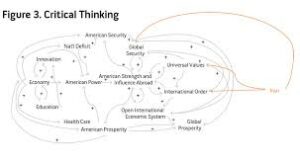The Dominance of Strategy and the Deficit of Strategic Thinking
The past few years have witnessed a widespread rejection of the liberal order that Western countries built up after 1945. The pillars of the post-World War II system (Bretton Woods,
NATO, EU) are shaken by internal controversies and external challenges. Hard (military
and economic) power fails to tame the forces of entropy that have gained uncontrollable
acceleration. The activation of the centre of gravity depends on the culture of strategic
thinking, i.e. the theoretical and empirical ability to read details and penetrate the
intangible and invisible of the world stage, such as: culture, history, collective identity,
family, race, ethics, honour, heroism, sacrifice. Strategy is no longer equated with hard
defence, nor is it shaped by knowledge, but it belongs to thinking and especially to critical
thinking. This article is a result of collaboration of three authors from the Hellenic
National Defence College, the Dartmouth Centre for Seapower and Strategy at University
of Plymouth and the Defence Studies Department, King’s College London.

The post-Cold War era has seen a proliferation of the term strategy and its derivatives:
grand strategy, applied strategy, strategic studies, strategic policy, strategic interests,
strategic partnership, strategic alliances, strategic communication, strategic actor, strategic
competitor, strategic corruption1
, strategic objective, strategic vision, strategic culture, even
strategic trade as a brand new post-graduate program.
And yet when it comes to strategy’s principal component, strategic thinking, there is near
complete silence. Indeed, what is striking is that the increase in the number of references to
strategy is inversely related to the deficit in strategic thinking, to the point where the latter
turns into a security deficit, both national and international. This is because the notion of
strategy, as developed in the West after 1945, limits the analyst’s vantage point to viewing
the tree, but not the whole forest. In other words, the individual tree, which relates to military
might, has become a substitute for the forest, which pertains to multi-dimensional security.
This leads to deceptive feelings of power, which in turn, result in global problems that are
chronic and hard to solve. The attempted resolution of such problems frequently features
the use of military means, aiming at unattainable outcomes, which, sooner or later, results
in disorderly retreat, defeat or quagmire. The hyper-polarised Middle East, extending from
Afghanistan to Somalia, Yemen and Libya provides plenty of examples, which support the
claims made above.
By contrast, adversaries of the West excel at utilising all levers of national power to
achieve their strategic objectives. This is partly as a result of their ability to think strategically
and set long-term goals, unfettered by the demands of liberal democracy and short-term
electoral cycles. Furthermore, in more illiberal states decisions about strategy and policy
tend to be made by small groups (and even individuals), facilitating greater strategic agility.
Consequently, the West runs the risk of being out-thought by its strategic competitors.
Entropy-Gravity
In the natural sciences, the term “entropy” is intended to convey the disorderly pattern of
molecules and, more generally, the tendency of all material substances to dissolve into their
constituent particles. In the context of this paper, it is used to denote the inherent lack of
479
THE DOMINANCE OF STRATEGY AND THE DEFICIT OF STRATEGIC THINKING
order in the international system and the tendency of political entities to disintegrate into
their ethnic, religious, tribal and other groupings.2
In nature, this disorder of the parts is
regulated by the center of gravity. The entire universe is subject to the powers of entropy
and the law of gravity.
In society, centrifugal forces are held in check by the state (though not always successfully)
via the mechanisms of the 3 + 1 branches of government (executive, legislature, judiciary
and the impersonal bureaucracy)3
and controlled or ‘domesticated’ by a nation-based
collective identity, itself an indispensable element in a stable and orderly society. The
national factor has been decisive in the spectacular development of certain countries in East
Asia such as Japan, China and South Korea. These are countries that possessed a highly
developed national consciousness and a firmly entrenched collective identity well before
their encounter with western powers and the onset of their technological modernisation.4
The primacy of collective identity is intimately connected to the law of social gravity,
which holds in check the forces of entropy and directs them in an orderly fashion for the
purpose of society’s modernisation. The priority of communitarian values as a means to
fast track modernisation can be seen in Asian countries with a global economic orientation,
like Japan. Although knowledge of the English language enhances status and opens up
professional opportunities, citizens still insist on the primacy of the Japanese language,
culture and identity known as nihonjinron.
5
The law of social gravity is steeped in Chinese tradition and operates as the centre of
gravity by exerting a powerful cultural attraction that assimilates the forces of entropy in
that vast state. It is indicative that the country continues to call itself the Middle Kingdom
(Zhongguo). There are, of course, other countries such as India and Russia, whose longestablished cultures differ in significant ways from that of the West. These are two diversified
countries that possess a powerful cultural gravitational pull which restrains the forces of
entropy and prevents them from getting out of control.
Western experience, which shaped the post-1945 international system and world order,
appears to be radically different from that of Asian nations. The Western system conforms
to its own law of gravity, namely the law of Western capitalism as evolved into a neo-liberal
religion with its own distinctive characteristics: Privatisation, the primacy of shareholders,
market concentration, deregulation, private charity as a substitute for the welfare state,
emphasis on the unitary individual rather than the citizen, a growing income gap between
the richest 1% of the population and workers on minimum pay, de-nationalisation and
weak identity with attendant destruction of distinctive cultural traits at the local level. As
professor of international political economy from Harvard University, Dani Rodrik, warned
even before the 2008 financial crisis, the latest phase of “extreme globalisation” creates a
political trilemma: Democracy, national sovereignty and global economic integration are
mutually incompatible. We can combine any two of the three, but never have all three
simultaneously and in full.6
Restricting citizens’ sovereignty undermines democratic rule which, in turn, generates
feelings of anger in ordinary people and prompts them to violent behaviour. This has been
the dominant tendency in the context of neoliberal globalisation and multiculturalism,
which imparted a frenetic acceleration to the forces of entropy.7
These forces appear to
be particularly resistant to the attraction of social gravity inasmuch as the standard means
THE DOMINANCE OF STRATEGY AND THE DEFICIT OF STRATEGIC THINKING
480

of restraint and control, i.e., nation and state, have, in effect, been replaced by financial
markets and the digital economy as well as by the influence of special interests. In this
respect, the findings of Transparency International are revealing: there are 25,000 lobbyists
in Brussels spending over 1.5 billion euros each year; 75% of all lobby meetings by
European Commission officials were with corporate lobbyists, 17% with NGOs, 4% with
think tanks and 2% with local authorities.8
In the national political realm, the forces of entropy (politicians, bureaucrats, intellectuals,
employers and employees) are driven by self-preservation and the forces of gravity are
extremely weak, because the main component is missing – self-awareness.9
In so far as the international system is concerned, these centrifugal forces have developed
a perpetual anarchic dynamic of their own which is hard to contain either through the use
of military might by the most powerful countries or through international organisations and
supranational institutions such as the European Union with its mighty bureaucracies and
monetary integration. This is because they are powerless to forge social cohesion, as this
capacity remains an attribute of the nation state. Being inherently undemocratic, supranational organisations and unions recourse to heavy-handed, top-down practices and resort
to the mass output of laws, directives and regulations which result in a setting of enhanced
entropy.
Strategic Thinking
One of the traumatic consequences of the pandemic is the acceleration of entropy due
to comprehensive social distancing measures and the inevitable tendency toward growing
division and national self-reliance, undermining the perceived inevitability of the forces
of globalisation and integration. The common understanding that increasing globalisation
appeared to make geographical and territorial boundaries less significant, thereby perhaps
making states less important, has been turned on its head by the pandemic as individual
states brought a halt to a fundamental aspect of globalisation, the movement of people and
goods. Strategic thinking remains, however, the most effective way to tame the forces of
social entropy. For leaders and elites, this necessitates developing a holistic view, that is,
a view which encompasses the entire forest with all its details, even the invisible ones, in
order to activate the forces of social gravity.
There are ample historical examples, which can help in the formulation of effective
policies. The focus below is on leading statesmen who ascertained the timeless values of
strategic thinking, beginning with Thucydides – designated as the doyen of critical thought
by French Classist Jacqueline de Romilly. He was the first military commander who was
also a true intellectual and whose rare combination of military experience and sagacity
enabled him to penetrate into the depths of the human psyche. It was on account of such
extraordinary insight that he was able to properly assess the nobility of the democratic
ideals, as recorded in Pericles’ Funeral Oration (Thucydides, B 34–47), as well as the lack
of personal dignity that comes with the loss of moral principles and justice, as given in the
Melian dialogue (Thucydides, E 84–116). In terms of our fundamental distinction between
gravity and entropy, the Funeral Oration represents the former, whereas the Melian dialogue
stands for the latter.
481
Another military commander-cum-intellectual of the ancient world was Alexander the
Great. From an early age, he received the best education possible from Aristotle (arguably,
the greatest philosopher of all time) and the finest military training through his participation
in the military campaigns of his father, Phillip II of Macedon. His strategic genius extended
beyond military matters, as shown by his use of Greek culture as the centre of gravity with
which to check the forces of entropy that were getting out of control under the previous
militaristic hegemony of Persia. It is for this reason that Alexander’s barracks appeared as
a university on the move, hosting a number of distinguished philosophers, geographers,
historians, medical experts, architects and urban planners who stood ready to transmit
knowledge, culture and splendid monuments.
The Macedonian example was imitated by the Eastern Roman Empire (also known as
Byzantium)

whose civil society provided an ample measure of social mobility inasmuch
as individuals from the lower socio-economic strata and of provincial origin could rise
to the highest echelons of society, in sharp contrast to the rigid, militaristic societies
of neighbouring peoples. The empire, which lasted for over a millennium, featured a
cosmopolitan society with its centre of gravity at Constantinople, which has been termed the
Byzantine Commonwealth by the Russian historian Dimitri Obolensky. The term indicates
a cosmopolitan community whose members acknowledged the supreme religious authority
of the Patriarchate of Constantinople, the primacy of the Byzantine emperor in matters of
foreign policy, the Byzantine legal tradition and the Byzantine influence in the arts.10
The military campaigns of Western powers, based on military prowess, had effects
that were diametrically opposite to those produced by Alexander as they set in motion
the anarchic forces of entropy. Indifference toward indigenous identities and cultural
heritages runs counter to the law of gravity and, therefore, such campaigns were doomed
to failure from the outset. The US provides a good illustration of our point for, although
a global superpower, it met with defeat in nearly all the military confrontations in which
it took part after 1945, including Vietnam, Lebanon, Afghanistan, Iraq, Syria and Libya,
as well as in its confrontation with ISIS which continues its deadly military operations.
A distinguished insider, Robert M. Gates, who has had a lengthy tenure in the NSC under
four Presidents and has also served as CIA chief and Secretary of Defense, provides a
convincing explanation, arguing that Washington has become overly dependent on military
tools while neglecting other policy instruments. Furthermore, the whole national-security
apparatus (Defense Department, CIA, NSC as well as the State Department) has failed
to keep up with developments and stand in need of radical organisational overhaul and
cultural shakeup. For the most part, the current state of affairs reflects the West’s inability to
distinguish between the whole and its parts, in other words, the forest from the tree, and to
focus on the centre of gravity that would enable it to restrain the forces of disintegration.11
The similarities of today’s Western countries with 15th Century Florence are quite
indicative. The similarities can be deduced from the contemporary account of Niccolo
Machiavelli, whose diagnosis of the city’s decline stresses the preponderance of financial/
commercial elements and the zero-sum pursuit of profit leading to the subsequent destruction
of the social fabric, reminiscent of today’s state of affairs. Such self-serving behaviour
benefitted a small minority and undermined social cohesion resulting in loose morals and
political weakness. The forces of entropy were no longer constrained by the law of gravity
and the city’s decline inexorably followed. Machiavelli, the seasoned analyst, stresses a
THE DOMINANCE OF STRATEGY AND THE DEFICIT OF STRATEGIC THINKING
482

recurrent truth: people who rule themselves will be most willing to fight for themselves. In
this regard, the role of the military commander-cum-intellectual who combines excellence
in war-making with broader scientific knowledge in, say, history or geography, is critical.12
Currently, the Western world can see 15th Century Florence in its image. In fact,
Machiavelli’s insightful remarks remain relevant in our own era. The 2020 Munich Security
Conference devised the self-revealing theme ‘Westlessness’ to describe the creeping decay
of the Western project: today, the West as we know it is contested both from within and
from without. In fact, the world is becoming less Western. More importantly, the West
itself may become less Western, too.13 The realization of the dangerous acceleration of
entropy forces, led the founder and Executive President of the World Economic Forum
(Davos), Klaus Schwab, to anxiously seek the new centre of gravity through a completely
new foundation for our own economic and social system, for a ‘Great Reset’ of capitalism,
which is the theme of this year’s discussion at Davos to mark the 50th anniversary of the
Forum.14
Returning to the 19th Century, the Prussian military commander-cum-intellectual Carl
von Clausewitz reintroduced the notion of immaterial factors which affect the centre of
gravity. The immaterial elements under consideration refer to the leader’s ability, breadth of
knowledge and perceptiveness in conjunction with the citizens’ spirit. The aforementioned
assets are expressed in the concept of ‘culminating point’ which relates to the enlightened
leader’s ability to identify the limits to which he/she can push things, including the point
at which a victorious advance ought to be halted. This requires cool-headed realism and is
conveyed by the term Realpolitik.15
Clausewitzian realism is not based on ideas of peace and appeasement but rather on the
cold calculation of national interest which, in turn, is identified with the struggle for power
as the essence of international politics. The instrument through which national interest is
pursued is not the prevention of war but preparation for war and even war itself. It follows
that unless states are proficient in the art of war they will succumb to the demands of the
strong and ruthless, as Thucydides has taught a long time ago.
Since history has vindicated this view, Clausewitz has been termed a realist and the
associated set of policies has come to be known as Realpolitik. It is the recognition of war
as the outcome of human behaviour that led to its being perceived as part and parcel of
national policy: consequently small, neutral countries like Switzerland which have pursued
war preparedness based on state-of-the-art professional standards and a fierce military
spirit amongst the population, have not experienced a peacenik movement or an attitude
of passivity. Nevertheless, Clausewitz stressed that states must not engage in war for war’s
sake or, in case they do, they should take all relevant factors into account. It follows that it
may not be rational to choose a minister of defence with a military background nor should
military officers other than the Chiefs of Staff be allowed to influence the government’s
decisions.16
Liddell Hart amplified the notion of the broad-minded leader whose talents go beyond
ordinary strategy to what he calls High Strategy. This notion follows from his observation
that force can always crush force but cannot crush ideas. The power of ideas and people’s
psyche are the irreducible elements of the situation and cannot be defeated. War-related
aggression has never produced definitive victory, either in the past (Napoleon, Hitler) or
483
now (witness the numerous US military engagements). What is needed is the ability to
win at the peace table, which requires moderation and the ability to identify the relevant
culminating point. To accomplish the indicated tasks, one must be much more than a mere
strategist: he/she must be at once political leader and philosopher, a combination which
must be predicated on strategic acumen.
Liddell Hart’s High Strategy constitutes the third and highest level of the security
pyramid, the other two being tactics and strategy. The concept is not intended as a cureall; furthermore, it cannot be put into effect without support from the culture of strategic
thinking, which, in addition to policy makers, must be diffused throughout the training
system and the entire policy-making apparatus.17
The development of strategic thinking requires in-depth case studies as it is intended for
explanatory, rather prescriptive, research and theory testing. For the purposes of illustration,
the following anthropomorphic representation of the security pyramid is employed:
• Tactics correspond to limbs,
• Strategy corresponds to the body’s vital organs,
• High Strategy corresponds to the brain with its directing functions,
• Strategic thinking is supposed to implement the organic synthesis of the above. The
attainment of the required synthesis depends on critical thought that, in turn, requires
multi-dimensional knowledge and experience which are the leader’s hallmark
(military, political or religious leader as well as intellectual).
Recommendations
We live in a world which is in a state of flux and in which the number of countries with
inflated ‘egos’ has been on the rise. As Lawrence D. Freedman has noted “power balances are
shifting and disruptive behaviour is becoming the norm.”18 Western countries face common
problems which, if not dealt with in a timely fashion, will get more difficult to resolve. In
particular, for the United Kingdom and Greece (both maritime countries located at opposite
ends of the European continent) the following concrete measures are recommended:
Organisational restructuring through the establishment of a High Command of Strategic
Thinking which will oversee the relevant educational institutions, publications, think
tanks and human resource management in the armed forces. A similar restructuring is
recommended for the Ministry of Foreign Affairs.
Reorientation of the National Security Council (established in 2010 in the UK, only
recently introduced in Greece) which, even prior to its establishment, had become obsolete
given its misplaced focus that undermined its ability to control the forces of entropy. It
follows that the decision making process stands in need of a flexible and forward-looking
agency (perhaps to be called the Council of Strategic Gravity) that would employ the
brightest people with a recognised record of excellence in a wide range of fields: former
officials (civilian and military), academics and other experts (including clerics) in areas
related to the most pressing issues at hand, who would be given the task of evaluating the
government’s approach, challenging the assumptions of policymakers and group-thinking,
and offering alternative courses of action.
THE DOMINANCE OF STRATEGY AND THE DEFICIT OF STRATEGIC THINKING

484
In order to be effective, the Council should avoid the following common errors: (a)
focusing exclusively on military issues, whether operational or tactical (b) engaging in
routine decision making by like-minded people whose jobs depend on political patronage.
It should take into consideration not only technical issues but all factors which enter into
the identity of regions and peoples: history, religion, demographics, education and every
element in the cultural sphere.19
It is high time to develop a culture of insightful strategic thinking by allowing ‘the
ideas to procreate’. Otherwise, in a fast-changing world in which the global distribution
of power is shifting eastward, we are bound to remain passive spectators of unanticipated
international developments and to simply acknowledge our security deficit, whilst being
out-thought by our strategic competitors.
Dr Georgios Mourtos
Dr Fotios Moustakis
Dr Tracey German
References
1
See analysis by three academics with long tenure in government, Philip Zelikow, Eric Edelman, Kristofer Harrison,
and Celeste Ward Gventer, The Rise of Strategic Corruption. How States Weaponize Graft, Foreign Affairs, July/August
2020
2
See Norman A. Bailey, “World suffering from social entropy”, Asia times, 21–11–19.
3
See, Ryan McMaken, “The Deep State: The Headless Fourth Branch of Government”, MISES Institute, reprinted by
Eurasia Review, 21–11–2019.
4
See Francis Fukuyama, Identity. Contemporary identity politics and the struggle for recognition, London: Profile
Books, 2018, p. 126.
5
See Eric Margolis, “Japan Doesn’t Want to Become Another Casualty of English. English skills bring status, but the
public remains stubbornly bad at learning”, Foreign Policy, 26–05–2020.
6
William H. Janeway, “The Retreat from Globalization”, Project Syndicate, Jun 26, 2020. For further reading, see also,
Benjiamin Studebaker, “The ungoverned globe: The end of the liberal order would unleash chaos; its continuance means
unconstrained economic suffering. What to do?”, Psyche (Aeon), Jun 15, 2020.
7
See Darwis Khudori, “The rise of Asia and the polarization of Global Forces: Western galaxy and Bandung
constellation” (Part III), Defend Democracy Press, 29/05/2020, and Francis Fukuyama, “The Pandemic and Political
Order. It Takes a State”, Foreign Affairs, July/August 2020.
8
Transparency International EU, “7,000 and counting Lobby meetings of the European Commission”, Brussels, 1
December 2015.
9
See, Charles King, “How a Great Power Falls Apart. Decline Is Invisible From the Inside”, Foreign Affairs, June 30,
2020.
10 Χαράλαμπος Παπασωτηρίου, Βυζαντινή υψηλή στρατηγική: 6ος-11ος αιώνας, β΄ έκδοση, Αθήνα: Ποιότητα 2000, σ.
74 κ.ε., 95–99, 252–253 [Haralambos Papasotiriou, Byzantine High Strategy: 6–11th Century, 2nd ed, Athens: Quality
Publishing 2000, pp. 95–99, 252–253].
11 Robert M. Gates, “The Overmilitarization of American Foreign Policy. The United States Must Recover the Full
Range of Its Power”, Foreign Affairs, July/August 2020.
12 Felix Gilbert, “Machiavelli: The Renaissance of the Art of War” in Edward Mead Earle (ed.), Makers of Modern
Strategy. Military Thought from Machiavelli to Hitler, Princeton, N.J.: Princeton University Press, 1973, p. 6, 8, 15–17,
20–24. Also, Niccolo Machiavelli, “The Prince”, trans. George Bull, Penguin Books, 1980, p. 78, 85–90, 103.
13 See Munich Security Report 2020, “Westlessness”.
14 See three insightful articles published in Project Syndicate: Klaus Schwab, “What Kind of Capitalism Do we Want?”
(Dec 2, 2019), Joseph E. Stiglitz, “Has Davos Man Changed?” (Jan 30, 2020), Klaus Schwab, “Time for a Great Reset”
(Jun 3, 2020).
15 H. Rothfels, “Clausewitz” in Edward Mead Earle (ed.), op.cit., p. 107-113. 16 See, Clausewitz, On War, Penguin Books, 1968, ed. & introduction by Anatol Rapoport, p. 38, 401–413.
17 See, B.H. Liddell Hart, Strategy, 2nd rev. ed., Meridian, 1991, p. 219–220.
485
THE DOMINANCE OF STRATEGY AND THE DEFICIT OF STRATEGIC THINKING
18 See, Lawrence D. Freedman, “Britain Adrift. The United Kingdom’s Search for a Post-Brexit Role”, Foreign Affairs,
May/June 2020.
19 See article from the author’s prize-winning entry for RUSI’s Thench Gascoigne essay competition, William James,
“Grandiose Strategy? Refining the Study and Practice of Grand Strategy”, The RUSI Journal, published online: 28 May
2020. See some interesting insights from the UK’s first NSA, Sir Peter Ricketts, “Speaking Truth to Power: The Problem
with Prime Minister Johnson’s New National Security Adviser”, Commentary (RUSI), June 30, 2020.
